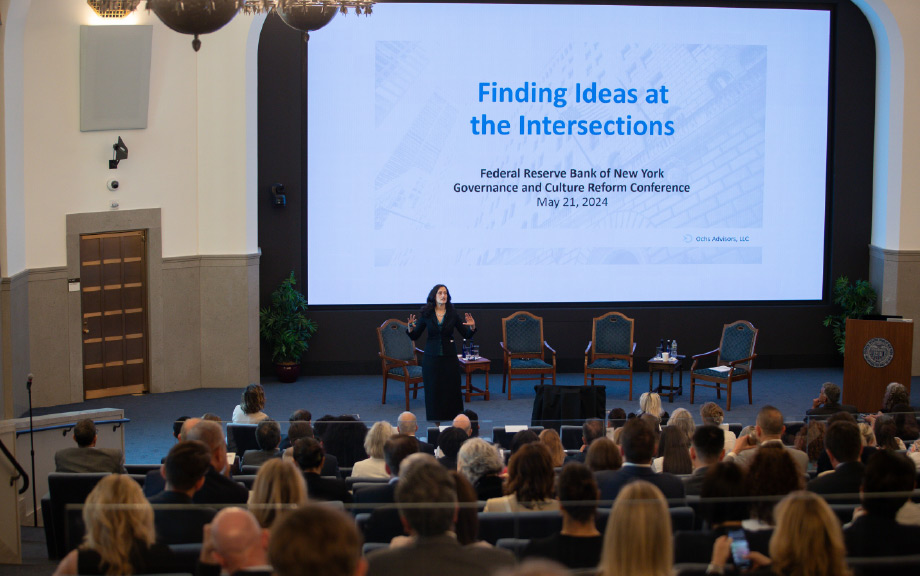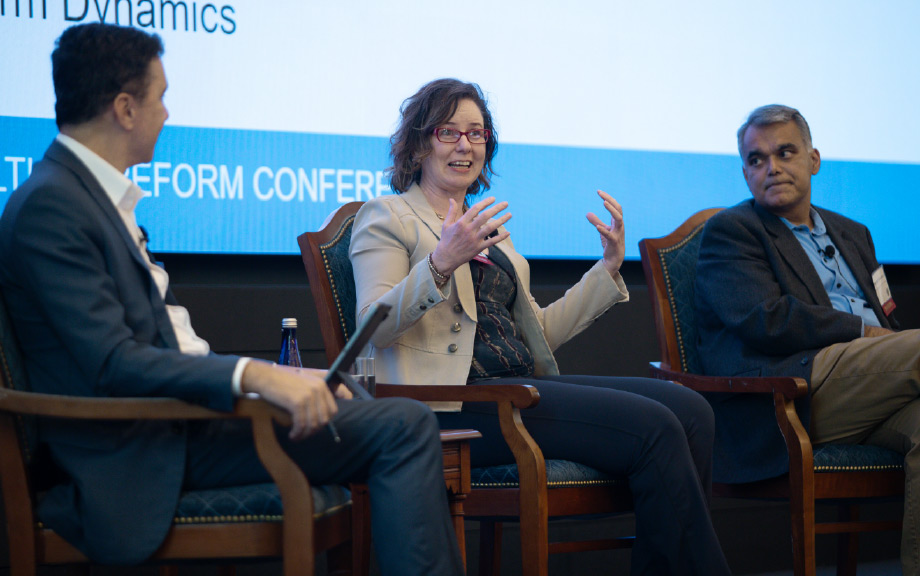
The New York Fed’s conference on culture in the financial services industry, held in May, marked the 10th anniversary of the Bank’s culture initiative.
One of the topics the conference focused on was the importance of accountability. As Joe McGrath of University College Dublin said, the people at the conference care about accountability because participants want financial services workers at every level to look proactively for issues, acknowledge mistakes will happen, and learn from them when they do. Speakers noted that adopting these practices is both important and challenging.
Ownership and Care
Speakers agreed that developing norms encouraging finding and surfacing issues must be preceded by creating norms of concern, care, and ownership. Speakers stressed the importance of tying staff’s actions to outcomes for a broader community by articulating how team members’ individual responsibilities connect to a bigger picture.
Susan Ochs, CEO of Ochs Advisors LLC, described experiments on subways in which bystanders were more likely to help a person in distress when there were fewer people on the train, and less likely to step up when the train was crowded. These experiments suggest people feel more accountable in smaller groups, she said. She added that a trained Emergency Medical Technician might be more likely than other bystanders to assist a sick passenger because of the EMT’s perception of being uniquely qualified to help. Providing someone with a description of why their role is unique and important can help them feel ownership and step up when needed, she noted.
Speakers recommended that “culture carriers” who demonstrate care and ownership should be recognized and rewarded publicly. The reward is particularly important given that culture carriers’ performance is ranked lower, on average, than their counterparts, said Constantinos Coutifaris of the University of Texas at Austin. These lower performance rankings could serve as a disincentive for colleagues to emulate their actions, he said.
Name the Elephants
Cultivating norms of care requires creating an environment where people can name what they see. Establishing habits of calling out the elephant in the room—saying uncomfortable truths—requires intentional context and thoughtful planning.

As Anita Williams Woolley of Carnegie Mellon University said, assumptions are often tacit and only acknowledged in the breach. She urged conference participants to make them explicit and say the quiet things out loud. It can become less uncomfortable to do so with practice, she added.
But truth-telling can extend beyond uncomfortable into risky. In these cases, Kelly Richmond Pope of DePaul University suggested that situation-based trainings and scenarios can help draw out tacit knowledge in a low-stakes environment. Gary Klein, president of MacroCognition LLC and ShadowBox LLC, shared a “pre-mortem” exercise, which is a risk management tool that asks team members to imagine, prior to implementing a project, that the project has already failed and then identify the issues that led to that failure. This can help establish an environment in which staff will voice unspoken understandings of weaknesses with less trepidation, because the exercise requires them to identify a source of failure. These strategies for drawing out the quiet parts can become habits and can eventually change expectations about what is said out loud, participants said.
How do groups know whether they’ve named the elephant? Harry Toukalas, CEO of Swarm Dynamics, said “honest language” could be measured by looking at the ratio of positive to negative sentiment. Too much positive sentiment can indicate excess spin or a fear to escalate problems, he added.
Model Fallibility
Creating the norm of acknowledging mistakes begins with senior leaders owning their own mistakes, participants said. Coutifaris said managers can normalize fallibility, build psychological safety, and increase their own accountability by sharing with their staff the constructive feedback they receive during their own performance reviews.

We all have profound weaknesses, said James Gorman of Morgan Stanley. People working on improving those weaknesses are the people he trusts with leadership roles, he noted. By sharing their own mistakes, leaders create an environment where mistakes are built into expectations, and are therefore acknowledged and addressed quickly, rather than being hidden or left unspoken.
Participants said issues that are hidden, wished away, or swept under the rug can grow into significant problems, sometimes with catastrophic effects. Consider, for example, the explosions of the space shuttles Challenger and Columbia.
Building a culture of accountability isn’t easy, but it is worth the continued effort, the speakers said. Looking ahead, participants said firm leaders and regulators should study transmitting healthy norms in a virtual environment, best practices for assessing culture in a world where artificial intelligence and advance computing play much larger roles, and the impact of technology on accountability, including the temptation to blame an algorithm rather than take ownership.
Visit the conference event page for a full replay of the event and to learn more about the featured speakers and their work. If this content relates to your work and you’re interested in attending future programming, please email NY.FRB.Culture.Events@ny.frb.org.

Toni Dechario leads the Awareness & Dialogue channel of the Governance and Culture Reform initiative.
The views expressed in this article are those of the contributing authors and do not necessarily reflect the position of the New York Fed or the Federal Reserve System.














